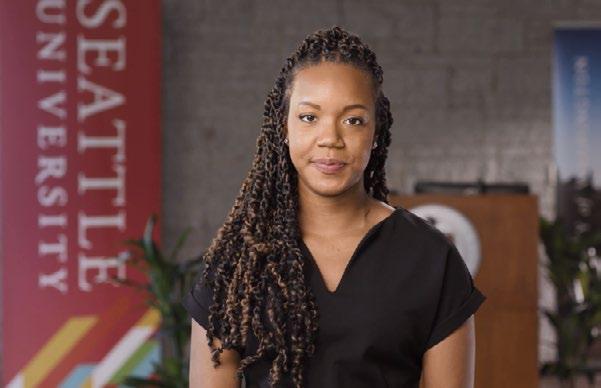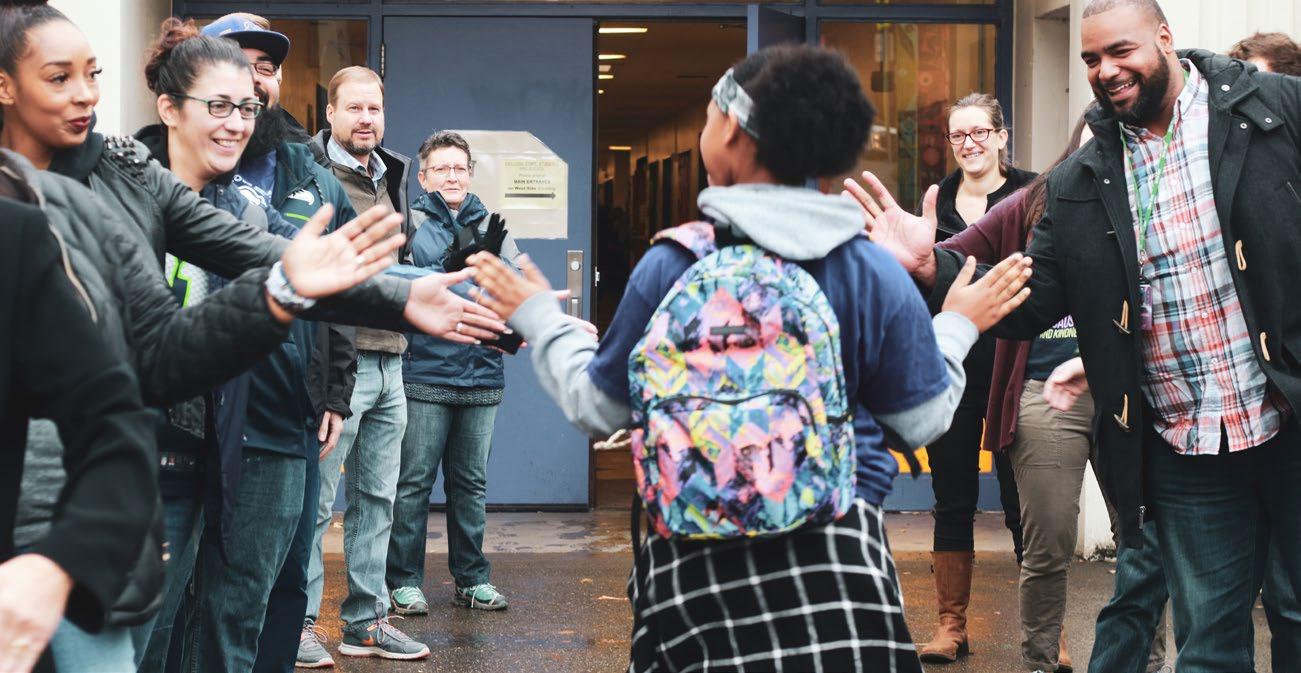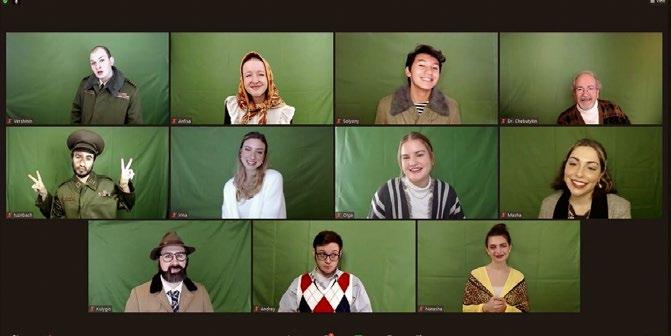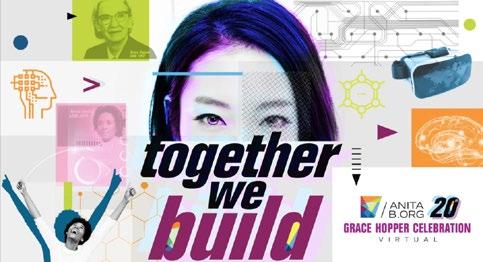
12 minute read
on campus
Costco Scholar and event speaker Noe Merfeld, ’20 (School of Law)
COSTCO SCHOLARSHIP FUND EVENT GOES VIRTUAL TO RAISE FUNDS FOR SCHOLARSHIPS
Advertisement
The COVID-19 pandemic didn’t stop the need for scholarship aid for underrepresented students and it didn’t stop the Costco Scholarship Fund from holding its 21st annual fundraising event, raising almost $4.4 million for scholarships benefiting students from Seattle University and the University of Washington. Since its inception, the Costco Scholarship Fund has raised more than $60 million for student scholarships.
A GREAT ‘GREEN COLLEGE’
The Princeton Review’s Guide to Green Colleges: 2021 ranked Seattle University #16 in the U.S. in its latest publication examining the nation’s most environmentally responsible colleges. The university moved up five spots from last year’s ranking, which put it in the Top 4 percent of all schools in the guide. Seattle U was among the schools that made a separate “Top 50 Green Colleges” list for universities that “share superb sustainability practices, a strong foundation in sustainability education and a healthy quality of life for students on campus,” according to the publication. The Princeton Review chose its Top 50 based on a combination of school-reported data and student opinion, collected in 2019–2020 via institutional and student surveys. TOP 20 IN U.S. FOR SUSTAINABILITY


Seattle University continued its run of top rankings for sustainability by once again being named a Sierra Cool School for 2020. It earned a spot in Sierra magazine’s Top 20, placing #20 of 312 colleges and universities—the top 7 percent overall—that participated in the latest survey of sustainability practices. Seattle U is the only university in the Northwest to place in the top group.
Associate Professor Dr. Quinton Morris, director of chamber and instrumental music and founder of the music education organization Key to Change, will serve as the first Artist-Scholarin-Residence for Classical KING FM 98.1 for a two-year term. In this new role, he will create 1012 radio programs and video podcasts featuring the music of Black, Indigenous and People of Color (BIPOC) composers and performers that will be distributed nationally to classical radio stations across the country. He will also start a composer residency program, selecting two living BIPOC composers to write or arrange new pieces for his Key to Change Studio.
“I have literally grown up listening to KING FM. As a kid, I remember listening to the radio as I would get ready for school and it’s been wonderful to continue my partnership with them in this new capacity,” says Dr. Morris.

SEATTLE U PLEDGES SCHOLARSHIP SUPPORT FOR STUDENTS OF COLOR
By Allison Nitch
This past fall, leadership representing Seattle University and Rainier Scholars signed a memorandum of understanding ensuring Seattle U will meet the full demonstrated financial need for every Rainier Scholar newly admitted to the university.
“This increased financial commitment makes a crucial difference in the college access landscape for our scholars, who have the ability, but not always the financial means, to thrive in challenging higher education settings,” says Derek Rogers, Rainier Scholars director of college counseling.
Effective in fall 2021, the scholarship will cover four years of tuition and fees, room and board and educational expenses—minus the student’s estimated family contribution as determined by the Free Application for Federal Student Aid (FAFSA).
“Rainier Scholars is recognized as a proven educational program of high quality in Seattle, closely mentoring and supporting deserving students over the course of their education,” says President Stephen Sundborg, S.J. “Seattle University is excited to partner with Rainier Scholars, helping these students succeed through their university experience.”
The mission of Rainier Scholars, now in its 20th year, is to cultivate the academic potential and leadership skills of hardworking, low-income students of color from fifth grade through college graduation. The organization partners with school districts in Highline, Renton and Seattle, where scholars attend public, private and independent schools.

“We are grateful for this partnership and for Seattle U’s shared commitment to educational equity, which has the potential to benefit not only our scholars, but also our region,” says Monica R. Parker, Rainier Scholars acting executive director.
Once a Rainier Scholar enrolls at Seattle U, the university is … “committed to establishing one point of contact within Student Financial Services for Rainier Scholars to access throughout their time at SU, along with onboarding and orienting students so they’re aware of the different student support services available to them,” says Melore Nielsen, interim vice president for Enrollment Management and dean of Admissions.
—Stephen Sundborg, S.J., president
“This new partnership with Rainier Scholars reflects our renewed commitment to prioritizing the recruitment and retention of underrepresented students of color, as outlined in LIFT SU, our new Inclusive Excellence Action Plan for Racial Equity and Anti-Racism,” says Provost Shane P. Martin.
The students will continue to receive ongoing support from Rainier Scholars staff to ensure they remain connected and aware of available resources to enhance their success while pursuing their collegiate studies.
THE SHOW MUST GO ON THE SHOW MUST GO ON
Seattle U’s Theatre program stages a virtual production of an Anton Chekhov classic
By Allison Nitch
How do you put on stage performance—replicating as close to possible a real theatre experience—in light of COVID-19?
Seattle University’s Theatre department has done just that. Abiding with social distancing measures, the department coordinated a virtual production of Anton Chekhov’s Three Sisters.
“This show was selected before COVID-19 happened,” says Ki Gottberg, director and theatre professor. “I love the play, never tire of listening to the ideas and adore how truly funny it is … and how poignant.”
Three Sisters streamed its four performances Oct. 29Nov. 1, 2020, with tickets supporting the Theatre Program Scholarship Fund.
A look at the cast—in costume— during a run-through of Anton Set in the “now/future of a postpandemic world,” Gottberg Chekhov’s Three Sisters. adapted the script to suit a virtual presentation. Over the summer, she met online with longtime composer, collaborator and Grammy winner Casey James. “For me, having a character burst into song as the only way to really express their feelings is inherently theatrical,” says Gottberg. “It all just seemed too perfect not to try and dig into this old classic in a new way.”

Each quarter, the Performing Arts & Arts Leadership (PAAL) Theatre program fully produces a show, including costumes, light, props and sound, to give students the experience of working on a professional production. Mounting a theatrical show virtually required new outlooks and strategies for the program. It starts with a production team comprised of professional designers, their student mentees and Gottberg to go over the script and ideas for props, costumes and how to create a theatre experience online. Known as the “Stream Team,” students and their mentors then began strategizing how to share the production virtually.
“There are not many ways to enter or exit a Zoom square. There can’t be ‘furniture’ or a naturalistic space,” explains Gottberg. “Actors are not feeling each other’s energy in the room together. But the play itself is so wonderful and rich and the student’s desire to fully inhabit these complex characters is powerful.”
Talia Rossi, ’21, a double major in theatre and psychology, says “… after getting used to the set up and going indepth with character analysis and action, it felt like this was a new and interesting way to perform.”
“Overall, this was a very rewarding process because I was able to see the immense fortitude theatre makers have,” continues Rossi, who plays the character of Masha. “Theatre as an art form will never die out because so many people are so passionate about it and are willing to adapt and change to keep the art alive.”
She considers the upside to a virtual performance: It “can become … more accessible to people…a source of entertainment to enjoy in their own homes, while keeping the live action aspects of theatre alive. As an actor who hopes to pursue this as a career path, I am inspired by what the landscape of theatre is going to look like in the next few years.”
“It’s amazing to me that I get to be in one of the first virtual plays ever as an actor,” says Keanu Armitage, ’24, a double major in theatre and kinesiology, who plays the character of Solyony. “I can work on my facial expressions, visual learning skills and acting versatility with others using nothing more than virtual communication.”
CREATING A SAFE PLACE AMID A PANDEMIC
An element of the Safe Start Welcome Center involves College of Nursing students who gain invaluable handson experience in population health
By Allison Nitch
While most Seattle U courses are held online due to the pandemic, campus is still open for essential work, classes and other needs. To safeguard those individuals, the new Safe Start Welcome Center serves as the first stop for anyone visiting campus who has not already received approval through the online Safe Start Health Check. It’s also a site for the yearlong Population Health Internship (PHI), a required part of the College of Nursing undergraduate Bachelor of Science in Nursing program.

Located in the Bannan Building, the center mimics a streamlined clinical setting outfitted with a computer station, temperature reader and personal safety supplies. It is “providing a very rare opportunity for nursing students, during their education program, to learn about and respond to a population health emergency,” says Assistant Professor and PHI Coordinator Jennifer Fricas, PhD, MPH, RN.
Over the summer, Tara Hicks, ARNP, director of the Student Health Center, and Kristen Swanson, PhD, RN, dean of the College of Nursing discussed the possibility of involving nursing students in ongoing COVID-19 planning.
“Dean Swanson included me in the conversations she was having with various groups…to see how we might involve the PHI students…in meeting the health needs of our own campus community,” says Dr. Fricas, who supervises seven interns. As part of their preparation for the internship, students have taken COVID-19 Contact Tracing, an online Johns Hopkins/ Coursera course and received an orientation from Chris Wilcoxen in Public Safety about center setup and operations. Interns gain experience in engaging with individuals by answering questions about COVID-19. When it comes to controlling an infectious disease outbreak, the importance of symptom and temperature checks and consistent reporting/updating is emphasized.
Each campus visitor is directed to the center for screening, where they’ll begin by completing a Safe Start Health survey on Seattle U’s website in order to rule out any symptoms of COVID-19. Next, interns take their temperature, provide a sticker with the date along with hand sanitizer, education about signs and symptoms of what to watch for and a disposable face mask for those without one.
Interns are also “seeing all the details of how a large organization like Seattle U has to methodically plan for … a community-wide event such as this, which requires coordination among many departments, regular communication and the ability to be adaptable and incorporate new and changing information on a regular basis,” says Dr. Fricas.
The work of the nursing program and the Safe Start Welcome Center are emblematic of a population health model.
“Population health nursing differs from what we typically think of a nurse doing in a couple of ways,” says Dr. Fricas. “First, the nurse is caring for populations or communities, not only individuals and families. Second, the focus is on health promotion and disease prevention, rather than on caring for someone who is already ill.”
The focus on population health has been especially illuminating for CON student Carolann Rein, ’21.
“Population health nurses disseminate information to everyone. I have talked to students who do not need to be screened but want to be because they felt feverish, spoken with and educated visitors and students’ families, as well as construction workers on-site working at the university,” Rein says. “Education comes in all sizes.”

NURTURING FUTURE TECH LEADERS
Donor support opens doors for underrepresented female students in industry

By Allison Nitch
Since 2018, 10 female students enrolled in Seattle University’s Computer Science Program have received scholarships to attend the Grace Hopper Celebration (GHC), an annual conference described as the world’s largest gathering of women technologists from around the world. Due to the pandemic, this year’s conference was virtual and thanks to Seattle U donor contributions, 45 students were able to take part in this unique opportunity, representing Computer Science and Electrical & Computer Engineering programs.
“What’s unique about this event is that representation matters … having some of the most renowned female-identifying tech and tech-adjacent leaders speaking and sharing their journeys into this realm helps attendees feel less alone in the tech field,” says Sheila Oh, director of Seattle U’s Computer Science Fundamentals (CSF) Certificate Program.
Several events were held prior to the fiveday conference to help prepare students. With 33,000 attendees from more than 115 countries, hundreds of sessions, numerous keynotes, an open source day and networking opportunities, “… it can be an overwhelming experience, particularly for those attending a conference for the first time,” Oh says.
According to the National Center for Women & Information Technology, women represented 57 percent of all professional occupations, yet hold only 26 percent of computing and mathematical occupations as of 2019. “Inclusivity in a business sense helps the bottom line. Having women in the entire pipeline … there also are allies “…Having some of the most renowned female-identifying tech and tech-adjacent leaders speaking and sharing their journeys into this realm helps attendees feel less alone in the tech field. ” —Sheila Oh, director of Seattle U’s Computer Science Fundamentals Certificate Program and potential allies that need to brought into this conversation because just like with women’s issues, this is not something that only women should be working on,” Oh says. “This is a systemic issue that needs to be addressed on the student, departmental, college and university levels and making sure everyone is onboard with this type of support is necessary to make sure everyone’s voice is heard.”
Ana Carolina De Souza Mendes, ’21, CSF certificate student, says the scholarship made a huge impact on her life. “I keep working hard every single day to carve my path into the tech field. If that’s your passion, keep in mind it will be hard, but you’ll have a support system by connecting with other women in the field.”
The College of Science and Engineering reports 42 percent of its faculty are female and with the CSF certificate program, the female population ranges between a third to 40 percent, which is a big feeder into the Master of Science in Computer Science program.







